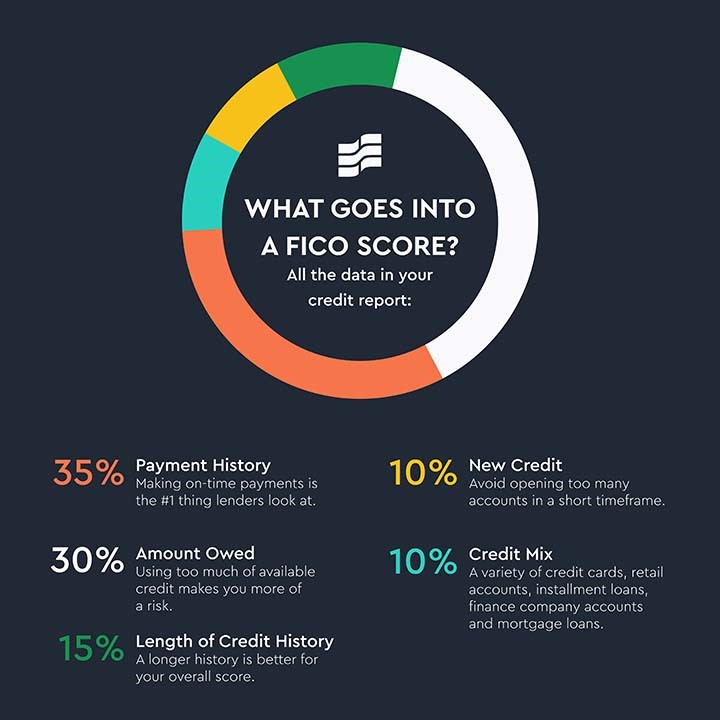
When it comes to your credit score, knowledge is power. Also known as a FICO Score (created by the Fair Isaac Corporation), having a higher score and good credit is key to securing better interest rates and terms when applying for a mortgage loan, student/personal loan, or credit card – and can save your money. In fact, 90% of top lenders rely on your FICO Score to determine whether you’re a good risk. Since many financial arrangements are long term, you want to secure the most advantageous terms from the start. So if you don’t currently have a good credit score, it’s time to make an effort to bump it up.
Understanding the Basics of Credit Scores
What is a credit score?
It’s a three digit number, typically ranging from 300 to 850, that rates your credit worthiness, and is calculated from the data in your credit report. It is individual to you, even if you get married.
Tip:
When you and your partner/spouse seek out a loan or new credit together, both of your credit scores will be factored in.
What is the average credit score, for comparison?
It’s easy to find your credit score using tools like Bank of Hope’s Credit SenseSM but assigning meaning to the rating is another issue, entirely.
To help you understand your score, the average US credit score is 714, as of 2021. It’s important to note that this was better than the annual average reported for the past 11 years.
Americans’ average credit scores will naturally fluctuate in response to sweeping economic changes. Plus, the average rating differs by age group, getting progressively better as generations age. So, if you’re a student only beginning to build a credit history, don’t fret. There will be plenty of time to further raise your credit score.
How FICO rates different credit scores:
- Very poor : 300 - 579
- Poor : 580 - 669
- Fair : 601 - 660
- Good : 670 - 739
- Very Good : 740 - 799
- Exceptional : 800 - 850
What does a credit score report show?
It’s a snapshot of your financial picture, both past and present. It contains your personal information, your credit account information with lenders and creditors, “soft” and “hard” credit report inquiries, bankruptcies and collection accounts.
How to check your credit report:
It’s FREE to do, so there’s no excuse for not looking through it at least once a year, if not every month, as some experts recommend.
Why is a good credit score so important?
Because it will determine how much money you will have to spend on interest and fees. A high score equals better terms. A low score means higher interest rates, and more money out of your pocket. Plus, you might not even get approved or qualify, as lenders or creditors will see you as a poor credit risk. Think about it, would you lend money to a friend who’s reckless with it, never pays you back, is always late paying their bills? You want a proven track record handling money when you:
- Take out a mortgage
- Buy or lease a car
- Apply for a credit card
- Rent an apartment
- Set up an account with a utility

What is factored into a credit score?
Just as your credit report reveals your financial history, a credit score reflects your relationship with money. Before you attempt to raise your rating, it's important to understand the criteria in the first place. Below are the five things lenders look at, and their level of importance, before deciding whether to give you a Yes or No.
- Payment history (35%) - Making on-time payments is #1 thing lenders look at.
A pile of bills in a corner never did anyone any good. You have to stay on top of due dates and pay on time, or your credit score will suffer. Red flags for lenders include charge-offs, collections, bankruptcy, repossession, tax liens, and foreclosures. Setting up bill pay or automatic withdrawal are great ways to make sure you stay current with payments or at least cover the minimum due each month for credit cards, utilities, student loans, mortgage payments, and medical bills.
- Amounts owed (30%) - Don’t use too much of available credit.
It’s a good idea to write down the total spending limit each of your credit cards gives you and the current debt you carry. The ratio of your balances to your credit limit (or loan balance to total loan amount) is known as credit utilization. Ideally, you should keep your credit card utilization at 30% or below. You want to avoid having too much debt or high balances. Both can affect your credit score, so do what you can to keep balances low or pay down current balances.
Tip: Think about doing a balance transfer of an existing credit card balance to a new card with a 0% or low introductory rate. It pays to shop around.
- Length of credit history (15%) - A longer history is better for your overall score.
It’s to your benefit to have credit or loan accounts going far back, as this tells a lender that you have experience handling money and an established record of maintaining accounts in good standing.
- Credit mix (10%) - A combination of loan types is better.
Having a variety of credit cards, retail accounts, installment loans, finance company accounts, student/personal loans, and mortgage loans show you can manage different types of loans.
- New credit (10%) - Avoid opening too many accounts in a short timeframe.
While it’s tempting to shop around for better deals, you don’t want to submit too many applications for “new credit” as it can ding your FICO score. Each time you submit an application for credit cards, auto loans and mortgages, it shows up on your credit report as a “hard credit inquiry.” So do your research to make sure you really want a certain financial product – and think about spacing out your applications.
Tip: Only inquiries made within the last 12 months can affect your credit score. They’ll also be removed from your credit report after 24 months.
How Can I Raise My Credit Score?
Your FICO credit score is never set in stone, and there are plenty of ways you can change it – for the better.
- Pay attention - While some days it’s not easy to see your total debt owed, ignorance is not bliss. Reviewing your report keeps you in the know and allows you to stay on top of identity theft or fraud, see if any loans you have co-signed are in arrears, and address any errors you may find.
Tip: Since good money habits start early, young people should start keeping track of credit scores with their first credit card or loan.
- Practice responsible credit card usage - Tied heavily into the above tip, it's important not to be lulled into a false sense of security by the idea of "buy now, pay later." To learn about practical usage (and opportunities for rewards), read 8 US Credit Card Tips that Put You in Charge.
- Consider enrolling in auto-pay for utility bills, mortgages, credit cards, and other recurring payments that can lead to debt - This advice doesn’t apply to everyone, especially those who still work towards building up a solid cushion within their checking account. If you worry that an automatic credit card payment may lead to overdraft fees or eat into essential day-to-day spending, it’s best to manually make payments.
On the other hand, if you’re someone with an established financial buffer but lets a utility bill occasionally slip your mind, automatic payments will be your best friend! This way, you’re guaranteed to keep your debt in check and gradually raise your credit score without any additional work on your part.
- Don’t close accounts - Even if you no longer use a certain credit card, it’s smarter to keep it open as it will add to your credit history, your total available credit and your credit utilization. If you need to, maybe hide or cut up the card so you’re not tempted to charge expenses.
Tip: A card with an annual fee or high interest rate might not be worth keeping open if you no longer use it. Call your card issuer to see if you can switch to a no annual fee card.
- If you don't have one already, open a US credit card - This piece is especially relevant to young adults who’ve had little time to build towards a good credit score. The earlier they can begin to build a track record of responsible, on-time payments, the better. In fact, individuals as young as 18 years old can begin to produce a credit history. That being said, it’s important that parents teach their teenagers about the dangers of frivolous spending, as well as have safeguards in place like a lower spend limit and having a trusted adult share joint ownership of the account.
To help minors get in the habit of mature financial practices in preparation for their first credit card, consider opening up a SmarTEEN Checking account.
- Ask your credit card provider for a raised credit card limit - Let’s revisit our previous point about how the percentage of the limit utilized ultimately influences your score (the lower, the better). If you spend $2,000 with a credit limit of $5,000, your utilization is 40% (above the recommended amount). However, if you spend that same $2,000 but have a $10,000 limit, your utilization is only 20%, further strengthening this credit scoring factor.
- Think twice about cosigning any loans - While it’s generous to help out a family member or friend, you should feel really confident that they’re going to be reliable and responsible. Because, if the other person is late or misses one payment, or skips out on the loan entirely, you are still responsible for repaying the whole amount borrowed – and that will affect your credit rating.
- Don't forget about your business credit cards given to you by an employer - Business credit cards have a wealth of benefits for the user, but it's not without its small risks. If the company that issued you the credit card fails to keep up with its payments or has a high utilization percentage, your credit score may ultimately suffer.
- Monitor your credit with Bank of Hope’s Credit Sense SM - Free and available through online/mobile banking, now you can easily stay on top of your credit:
- View your credit score and review your credit history — without affecting your credit score
- Get a Credit Score Analysis explaining your score
- Set up valuable alerts
- Access resources to help manage your finances
- Find out more at https://www.bankofhope.com/personal-banking/digital-banking/credit-sense
Sign in to Online Banking or download our Mobile Banking App to easily monitor your credit score.
Meg Schutte is a Bank of Hope Blog contributor.
The views and opinions expressed in this article do not necessarily represent the views and opinions of Bank of Hope.

 Meg Schutte
Nov 15, 2021
Meg Schutte
Nov 15, 2021




